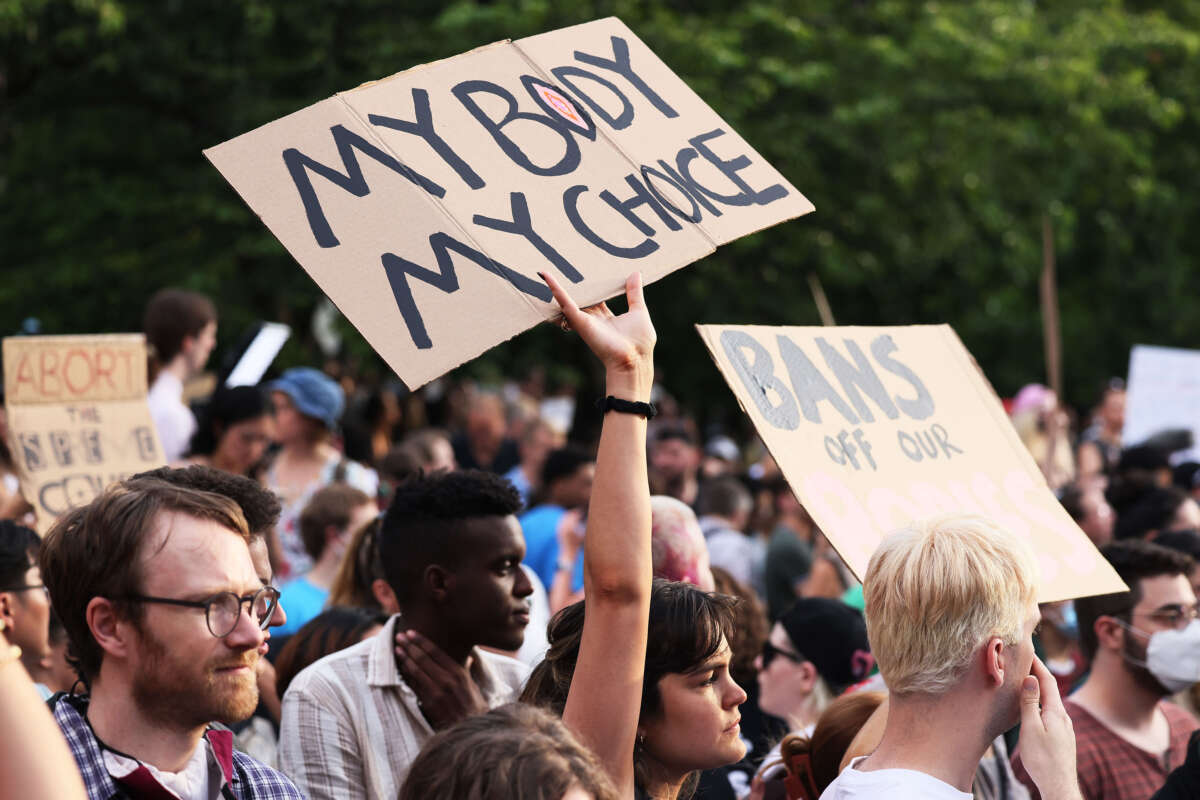Support justice-driven, accurate and transparent news — make a quick donation to Truthout today!
A new poll demonstrates that young people across the U.S. are less inclined to live in and accept employment in states that have restrictive policies on abortion.
The CNBC + Generation Lab Youth Poll, conducted from April 26 to May 2, examined the viewpoints of respondents between the ages of 18 and 34. Among a number of issues, the survey asked young Americans how their living choices and employment selection — including where they would seek or accept employment opportunities — are affected by abortion accessibility.
Asked about whether they’d want to live in a state that bans abortions, the poll found that a majority (62 percent) would “probably” or “definitely” not choose to do so. Just 39 percent said that they “probably” or “definitely” would live in such a state.
The prospects of employment could change these individuals’ views on the matter, as 55 percent in the poll said they would likely accept a guaranteed job in a state with restrictive abortion bans. However, a significant portion of young workers, 45 percent, said they would lean against doing so.
Of the 55 percent of respondents who said they would potentially accept a job in a state that bans abortion, 35 percent said they would only “probably” do so — indicating that around two-thirds of those who expressed a willingness to take such a job would likely give serious thought to the matter before formally accepting.
The poll showcases how young workers across the U.S. are leaving conservative states in large numbers due to abortion bans and other restrictive policies, including bans on transgender health care, bans on teaching about race and sexuality in schools, and more. Indeed, only one red state in the U.S. (Texas) is bringing in more college graduates than it is sending out.
With young people desiring to live in states with more abortion protections, companies will likely follow suit, said Cyrus Beschloss, the CEO of The Generation Lab.
“These numbers on abortion have gigantic implications for just about every large company in America,” Beschloss said. “Companies must know they’ll be freezing out or at least scaring a large part of the young talent they’re trying to hire when they’re based in one of these states.”
Fourteen states in the U.S. have near-total bans on abortion, making limited exceptions for the procedure only when a pregnant person’s life is at risk. (In practice, this exception is rarely enforced, as providers fear the state may not agree with what constitutes a life-or-death decision.) Additionally, three more states ban abortion at six weeks of pregnancy, and two ban the procedure after 12 weeks.
In total, 21 states have implemented an abortion ban that’s more restrictive than what had been in place prior to the Supreme Court’s overturn of Roe v. Wade in 2022. Three other states have abortion bans on the books that are currently being blocked due to legal challenges.
A terrifying moment. We appeal for your support.
In the last weeks, we have witnessed an authoritarian assault on communities in Minnesota and across the nation.
The need for truthful, grassroots reporting is urgent at this cataclysmic historical moment. Yet, Trump-aligned billionaires and other allies have taken over many legacy media outlets — the culmination of a decades-long campaign to place control of the narrative into the hands of the political right.
We refuse to let Trump’s blatant propaganda machine go unchecked. Untethered to corporate ownership or advertisers, Truthout remains fearless in our reporting and our determination to use journalism as a tool for justice.
But we need your help just to fund our basic expenses. Over 80 percent of Truthout’s funding comes from small individual donations from our community of readers, and over a third of our total budget is supported by recurring monthly donors.
Truthout has launched a fundraiser to add 500 new monthly donors in the next 10 days. Whether you can make a small monthly donation or a larger one-time gift, Truthout only works with your support.
